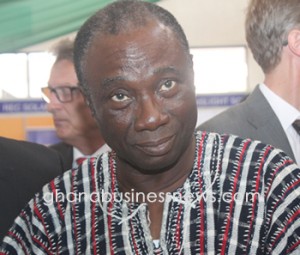Ghana government to begin process for benchmarking price of solar energy
 Power Minister, Dr. Kwabena Donkor has said the government expects to begin the process for establishing a benchmark price for solar energy, by the end of the year.
Power Minister, Dr. Kwabena Donkor has said the government expects to begin the process for establishing a benchmark price for solar energy, by the end of the year.
The minister, speaking at the opening of the fourth West African Clean Energy and Environment Exhibition and Conference (WACEE) on November 3, 2015 said the price benchmarking process would begin with competitive tendering for a 20MW solar farm, the result of directives from his outfit to the Energy Commission and other agencies.
The conference ongoing in Accra, has attracted several investors and retailers in renewable energy and is also offering a platform for knowledge transfer in renewable energy to interested indigenes.
Dr. Donkor said the price of solar energy in countries such as the United Arab Emirates, South Africa, Brazil and Uganda, is far below the price of electricity generated from conventional sources and government’s intent therefore, is to increase the contribution of renewable energy cost-effectively.
“We have counted the cost and are determined to accelerate the development of the value chain of renewable energy innovatively”, Dr. Donkor said.
He said Ghana’s renewable energy potential needs to be harnessed as it provides the opportunity to address energy supply security challenges and to mitigate the threat of climate change by cutting greenhouse emissions.
The Minister said stand-alone renewable energy is also considered by government as one of the ways to improve the 80.5 per cent coverage and to achieve universal access to electricity in the country, by 2020.
He said government has enacted the Renewable Energy Act 2011 (Act 832) to address Ghana’s energy supply security challenges and provide a legal framework for light scale deployment of renewable energy.
The result he said, is a surge in investor interest: the Volta River Authority’s 2.5 megawatt solar PV farm at Navrongo established in 2013, a 20 megawatt at Mankoadze in the Central Region, and several other ongoing wind and solar installation projects.
He added that the VRA is currently undertaking feasibility studies to add 12MW of solar energy in the Upper West Region, and 75MW from wind along the eastern corridor of the Greater Accra Region.
“Renewable energy however, will not come cheap – at least in the short term – and as a country we must brace ourselves for this phenomenon in the interest of unborn generations,” he said.
At the present and in the short term, Dr Donkor said the existing renewable energy installations may not be adequate to provide base load power, due to the huge deficit, hence the pioneering of other complimentary measures such as rooftop solar solutions and net metering.
By Emmanuel Odonkor
